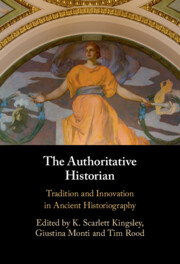Book contents
- The Authoritative Historian
- The Authoritative Historian
- Copyright page
- Dedication
- Contents
- Contributors
- Preface
- Abbreviations
- Introduction
- Part I Myth, Fiction, and the Historian’s Authority
- Part II Dislocating Authority in Herodotus’ Histories
- Part III Performing Collective and Personal Authority
- Chapter 9 Singing and Dancing Pindar’s Authority
- Chapter 10 Authority, Experience, and the Vicarious Traveller in Herodotus’ Histories
- Chapter 11 Veni, vidi, vici
- Chapter 12 Self-Praise and Self-Presentation in Plutarch
- Part IV Generic Transformations
- Part V Innovation within Tradition
- Bibliography
- Index Locorum
- General Index
Chapter 10 - Authority, Experience, and the Vicarious Traveller in Herodotus’ Histories
from Part III - Performing Collective and Personal Authority
Published online by Cambridge University Press: 02 December 2022
- The Authoritative Historian
- The Authoritative Historian
- Copyright page
- Dedication
- Contents
- Contributors
- Preface
- Abbreviations
- Introduction
- Part I Myth, Fiction, and the Historian’s Authority
- Part II Dislocating Authority in Herodotus’ Histories
- Part III Performing Collective and Personal Authority
- Chapter 9 Singing and Dancing Pindar’s Authority
- Chapter 10 Authority, Experience, and the Vicarious Traveller in Herodotus’ Histories
- Chapter 11 Veni, vidi, vici
- Chapter 12 Self-Praise and Self-Presentation in Plutarch
- Part IV Generic Transformations
- Part V Innovation within Tradition
- Bibliography
- Index Locorum
- General Index
Summary
John Marincola’s research has thoughtfully explored the negotiation of authority in Herodotus’ Histories, revealing the extent to which the narrator is a highly intrusive one who organizes and steers the reader’s progression through the text.1 In Authority and Tradition in Ancient Historiography, he demonstrated how Herodotus’ first-person verbs mediate historical memory for his audience and in doing so draw upon the authority of performers of wisdom evident in fifth-century intellectual culture.2 This work also gestured toward the alternative means by which the Histories could generate expertise effects but did not have the scope to go beyond the narrator’s self-representation. This chapter will contribute to this project by surveying the rhetorical function of the narratee through the second person and impersonal ‘one’, and I will argue that its embedding of virtual experience into the text contributes to the work’s construction of authority.
- Type
- Chapter
- Information
- The Authoritative HistorianTradition and Innovation in Ancient Historiography, pp. 206 - 223Publisher: Cambridge University PressPrint publication year: 2023

